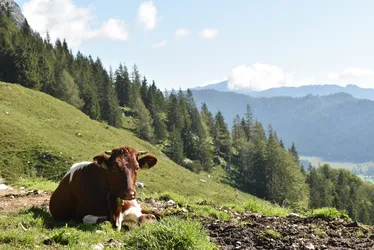AgroMission: GRASSLANDS BGD
Grazing and woody encroachment effects on biodiversity and carbon storage
Brief description: The project investigates how woody encroachment influences soil carbon storage and biodiversity in mountain grassland ecosystems. The research examines mountain grasslands with and without woody encroachment in the Berchtesgaden National Park and recorded plant and insect diversity and measured key soil parameters to quantify carbon storage. A reduction in carbon storage and biodiversity can reduce the resilience of grassland ecosystems and affect the long-term value of grassland to livestock farmers.
Background: Over the last 150 years, the decline in mountain grazing led to abandonment and ecological succession of many mountain grasslands. The consequences are the loss of centuries-old cultivated landscapes and the associated unique biodiversity and ecosystem services that are important to society. Currently, the more productive and easily accessible mountain grasslands near the mountain huts are managed relatively intensively, while the more remote mountain grasslands are grazed less frequently and are therefore more susceptible to abandonment, shrub encroachment and, ultimately, reforestation. The trend towards a decline in mountain agriculture is partly due to a lack of staff, but also increasingly due to the accelerating effects of climate change.
According to experts, adaptation measures are therefore urgently needed. Biogeochemical processes in mountain ecosystems are more sensitive to temperature than in temperate lowland regions. Rising temperatures and an extended growing season lead to an upward movement of species, which in turn results in changes in species composition as well as nutrient stocks and fluxes. However, it is not clear how climate change and grazing affect the productivity of mountain grasslands. To avoid the invasion of woody plants, farmers want to start the grazing season earlier in mountain grasslands, which may be an adaptation strategy. This adapted grazing regime could in turn significantly alter biogeochemical cycles, biodiversity and ecosystem services.
Objectives & approach
Building on previous results and good contacts with farmers, this project aims to investigate how the invasion of woody plants affects plant and insect species and soil carbon storage. The experimental setup includes a pairwise design with two treatments: encroachment with woody trees and no encroachment. For each treatment we established three transects and three survey plots along each transect. Vegetation surveys including species richness, cover, plant functional and agronomic parameters, and suction samples for insects have been conducted. In addition, soil biogeochemistry (including carbon, N and P stocks) will be analyzed and the main fluxes related to nutrient cycling and trace gases will be studied.
Working hypotheses
- Heavy woody encroachment reduces plant and insect diversity.
- Plant and insect diversity benefit from intermediate levels of woodland cover.
- High plant species diversity is associated with greater C, N and P stocks and a tighter nutrient cycle, which is reflected in lower CO2 fluxes and losses of inorganic N and inorganic and organic P.
Support program
The project is funded by the Weihenstephaner AgrarAllianz as part of the AgroMissionHub 2024 funding project.
Scientific Poster
Panassiti, B, J Ewald, M Hofmann, S König, S Seibold, J Burmeister, M Bott, S Schmidtlein, V Mutz, R Seidl, L Stilp, M Rufino 2024 Woody encroachment effects on biodiversity and carbon storage of mountain grassland ecosystems. GfÖ Freising.
Researcher team
Researchers:
TUM: Mariana Rufino, Louisa Stilp
HSWT: Jörg Ewald, Martina Hofmann, Bernd Panassiti
LfL: Johannes Burmeister
Berchtesgaden Nationalpark: Sebastian König, Rupert Seidl
Master theses:
Vera Mutz: Encroachment of Alpine pastures: Effects on species composition, diversity of vascular plants and plant-herbivore interactions in Berchtesgaden National Park
Michael Bott: Shrub Encroachment of Alpine pastures: Species composition, indicator values, and strategy of vascular plants along an altitudinal gradient in Berchtesgaden National Park
Bachelor theses:
Kim Jäger (insect diversity), Regina Gundlfinger (insect diversity), Paul Sturm (agronomy), Katalin Lepšík (woody encroachment)
Coursework:
Annika Graszies (insect diversity)


